Sir Keir Starmer: His first year as Labour leader
- Published
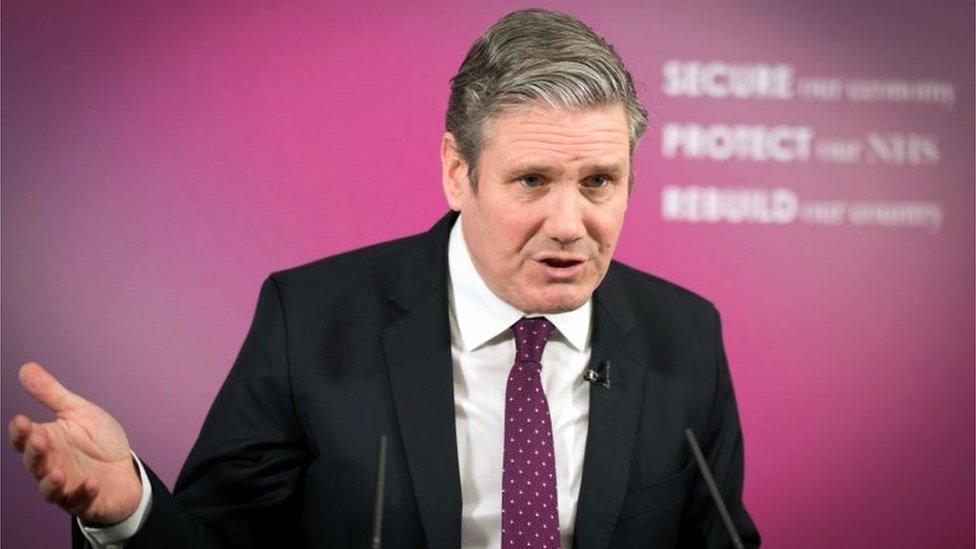
No adoring crowds - no 'moment' - accompanied Keir Starmer's elevation to the Labour leadership on 4 April 2020.
There was no rousing speech.
Instead, he recorded a video message against a backdrop of a white shuttered window, which seemed an appropriate image for a victory achieved during lockdown.
It was a low-key address, and almost a year on, Sir Keir's internal critics claim his leadership has remained underwhelming.
They say when he promised, on that day, not to indulge in "opposition for opposition's sake" he hamstrung himself, and subsequently failed to press home attacks on the government when it was vulnerable.
His supporters say that voters would have railed against too confrontational a stance during a pandemic.
And they point out that in his speech he signalled he'd take a more distinctive path as the cloud cast by Covid finally disperses.
"We cannot go on with business as usual," he said. And he pledged: "Where we have to rethink, we will rethink."
So how much progress has the Labour leader made towards fulfilling the promises he set out in this prospectus?
I've talked to some key figures across the party.
With Labour recovering from its historic defeat in 2019 but still behind the Conservatives in many polls, some would speak only off the record - though others were happier to signal either strong support, or clear criticism.
Slippery mountains
Sir Keir has faced the external challenge of winning back voters who abandoned the party for the first time in 2019, and he has emphasised several times that Labour has "a mountain to climb".
The new Labour leader recorded a video where he spoke of the "honour" of the post.
There are doubts, too, about what exactly Sir Keir wants to do if and when he reaches the summit.
But even in order to leave base camp, he and his allies have had to devote more of the past year than perhaps anticipated to dealing with internal challenges.
There were two passages in his victory address last April that appear to have proved mutually exclusive. He pledged: "I will bring our party together" - and described Jeremy Corbyn as "a friend as well as a colleague".
He then denounced the "stain" of anti-Semitism and declared "I will tear out this poison by its roots".
He certainly hasn't split his party down the middle but, one year on, he would be hard-pressed to claim that he has united it.
That friend and colleague was suspended from the parliamentary party by none other than Sir Keir himself.
No other act so easily underlined his claim to have put the party under new leadership.
But in doing so, battle lines were drawn with many supporters of the old leadership.
Fraying unity
Critics say party management has been more ad hoc than strategic.
Sir Keir may not have been looking for conflict but it has somehow found him.
Following his convincing victory, Sir Keir initially appeared to be serious about unifying the party.
For example, he appointed Morgan McSweeney - who ran Liz Kendall's ill-fated leadership bid in 2015 - to LOTO, the Leader of the Opposition's Office, but he also found a role for Simon Fletcher - a key figure in Jeremy Corbyn's successful leadership bid.
And while some of those closest to Mr Corbyn were turfed out of his shadow cabinet, there was a place for Rebecca Long-Bailey who was one of those who successfully nominated Mr Corbyn in 2015 and herself challenged Sir Keir for the leadership in 2020.
But within three months, Ms Long-Bailey was sacked.
Those who had always been sceptical towards Sir Keir complained, though there was little open revolt.
But some on the left had voted for Sir Keir not Long-Bailey, contributing to his decisive victory - and while they weren't openly critical, at this moment some began to grow uneasy.
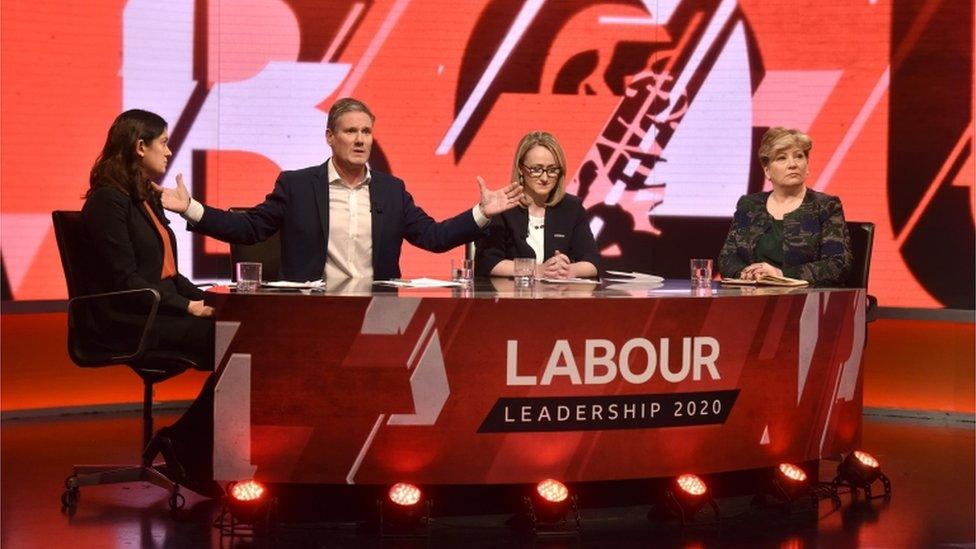
Sir Keir faced Lisa Nandy and Rebecca Long-Bailey in his bid for the leadership - Emily Thornberry did not secure enough nominations to stand
One prominent party figure told me: "It was a stretch to see Becky Long-Bailey as remotely anti-Semitic.
"She had the guts to speak out against others on the left under Corbyn."
This proved to be a warm-up for a much more heated battle.
Under new leadership
Sir Keir knew the response to the Equality and Human Rights report in anti-Semitism in the Labour Party had to be pitch-perfect.
But on the day of its long-awaited release last October, Jeremy Corbyn appeared to question the extent of anti-Semitism under his leadership.
He said: "One anti-Semite is one too many, but the scale of the problem was also dramatically overstated for political reasons by our opponents inside and outside the party."
Mr Corbyn was suspended from party membership, but then reinstated - with a rap on the knuckles - by a panel from Labour's ruling national executive (NEC).
It was following this decision that Sir Keir suspended his predecessor from the parliamentary party - meaning he cannot restand as a Labour MP unless the suspension is lifted.
This has lead to a wider breach between some on the left and Sir Keir.
Sources close to Mr Corbyn insist the Labour leader and his deputy gave authority to two members of LOTO staff to reach a deal to readmit Mr Corbyn.
And that this was negotiated initially with Unite's Len McCluskey and a shadow cabinet member sacked by Sir Keir - Jon Trickett.
LOTO sources say they were lobbied on Mr Corbyn's behalf, but no deal was struck.
Criticism of how this was handled wasn't limited to the left.
One backer of Sir Keir said that the current leader had made the previous leader look like a victim, and provided opponents of the new leadership with a casus belli.
Internal opposition to Sir Keir very much moved above the radar, with some left-wing members of Labour's ruling national executive staging a temporary walkout, and other pro Corbyn activists being suspended.
Mr Trickett and Ian Lavery - who was also sacked by the leader from the shadow cabinet - set up the 'No Holding Back' initiative with the former MP Laura Smith, who'd lost her Crewe and Nantwich seat in 2019.
This involved talking to party and trade union activists outside London, and she told me some had been demoralised by the leadership's actions. "You can't treat the membership - and politicians who have tried to get a Labour government for the past five years - like dirt than expect them to go out door-knocking for you or not voice their concerns," she says.
"There seems to be an effort in to either pushing people out or keeping them quiet."
More significantly, though, she believes the infighting has held Labour back in the polls.
"In our communities people aren't interested in internal warfare and battles within parties and for every moment we spend doing that, people switch off."
Charting a different course
But problems can bring opportunities, and not everyone has been worrying over divisions.
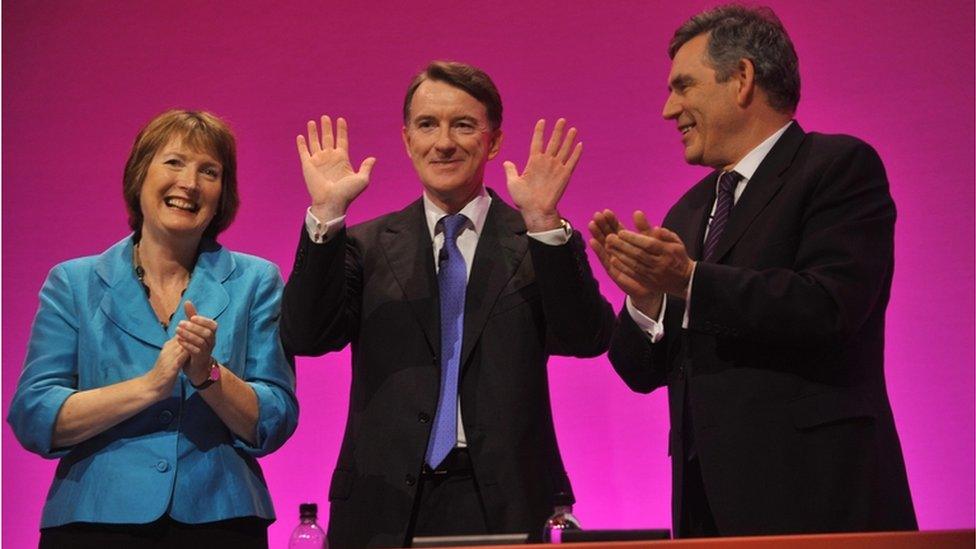
Lord Mandelson was instrumental in shaping Labour under Tony Blair
The former cabinet Lord Mandelson has been in touch with some on Sir Keir's team who want the benefit of his experience in taking Labour from opposition to government.
He tells me that Sir Keir was on the right track, but his internal battles are not yet over.
"There are times when he has shown courage during his first year, for example removing Corbyn's people in the party, suspending Corbyn himself, standing up to Len McCluskey…but this is just the beginning.
"He will be tested again and again - and he will have to take a lot more risk."
While battles with the Left have become more prominent in the press, beneath the surface, there has nonetheless been something of a quiet revolution under Sir Keir's leadership.
Last summer he succeeded in installing David Evans - who had worked as a party organiser under Tony Blair - as general secretary, the most senior official in Labour's head office.
Even more crucially, his supporters achieved a working majority, albeit slim, on Labour's ruling NEC.
Machine politics
Luke Akehurst, secretary of Labour First, which describes itself as a network that exists to ensure that the voices of moderate party members are heard, was elected to the NEC in the autumn, and explains why tilting the balance of power away from the Left has been significant.
"There are three focal points of power in the party - the leader's office, the general secretary and the national executive," he says.
"If you control all three of these, you can usually steer the party in the direction you want to go in."
And Mr Akehurst says the nature of the party has changed markedly from Mr Corbyn to Sir Keir.
"Membership is down on its absolute peak but in historic terms 512,000 is a huge membership.
"And it is being kind of reshaped in Starmer's image," he says.
"About 100,000 came in to vote for Keir or Lisa Nandy, or some for Jess Phillips - who in the end didn't stand - but they seem happy with Keir as leader. A comparable number of people who were Corbyn enthusiasts have left.
"Some people don't like hanging around in a party with a leader they didn't vote for. So the Labour party looks fundamentally different from the party that was there in November 2019."
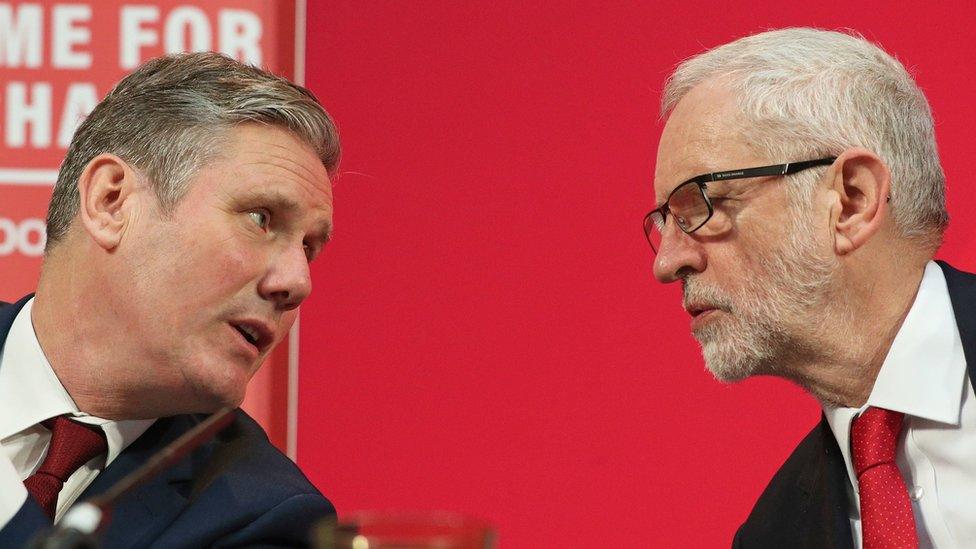
Has Sir Keir marked a break with the Corbyn era?
Mr Akehurst believes further change will follow, but this will take time. "I hope some more people will shift their politics - I'm into redemption for people.
"A lot of former Tony Benn supporters in the 80s ended up sitting on Tony Blair's front bench."
Insiders also give credit to Sir Keir's LOTO team for bringing about a leadership change in Scotland.
There are huge sensitivities, as any notion that the Scottish party is being treated as a "branch office" is toxic.
And some very senior figures in the Scottish party were urging caution on Sir Keir's part.
But faced with a potentially poor result in May's parliamentary elections, I am told the leader took the risk, albeit under the radar, of backing attempts to persuade the then incumbent - Richard Leonard - to stand down.
Power to change
Sir Keir Starmer has taken control of the party machine more swiftly than Mr Corbyn managed, but some are questioning what use he is making of this unprecedented power within his party.
In order to be heard in those seats in England where people turned away from Labour for the first time in 2019, he has been determinedly trying to eliminate perceived negatives.
He has made the union flag a regular backdrop to media interviews and public statements, to emphasise his patriotism - and create more clear blue water with Jeremy Corbyn.
Sir Keir has also declared that Labour is "the party of the family".
He has tended to assert this rather than demonstrate it.
But here there is a clear strategy.
Although she is his policy chief, Claire Ainsley doesn't want the party to be burdened with too many specific policies this far from a general election.
But before working for Sir Keir, she wrote a book called The New Working Class and it gives strong clues to her approach.
She said that polling suggested that the values that voters rate most highly across social classes are family, fairness, hard work and decency, and that women in particular "are likely to see policy through the prism of their children's lives, their parents and their friends".
So emphasising family will gain voters' attention, and presenting any future policies not in the abstract but what they mean in concrete terms for families are likely to make them appear more attractive.
While few firm policies have emerged, Sir Keir's supporters stress that he is involved in a four-year project, and that dramatic change cannot be expected straight away.
Policy work is going on, though not in full public view, but the main task so far has been to convince voters that the leader shares their values.
Sense of direction
But even some of those who are willing Sir Keir to succeed feel he has to set out a clearer sense of direction.
Lord Mandelson believes that "Covid eclipsed everything else. Without it, he would have been able to do more in day-to-day politics.
"We have lived through abnormal times, and although he has been tested by it, there is clearly a lot more to do. He needs to now pick up speed and work out a real argument and point of difference with the government."

The Labour leader was elected in April 2020 - as the pandemic took hold across the UK
And a key member of his leadership team said he still needed to be demonstrating that he can "rise to the moment" as the pandemic recedes.
There are concerns that his recent pre-Budget speech - setting out a "fork in the road" with the government - was bold on rhetoric but more timid in reality.
While he promised a different type of economy and a new partnership with business, some of his own backers believe that the substantive policy announcement - a national recovery bond - was not the kind of symbolic policy that might stick in the minds of prospective voters.
One of them told me that despite the pandemic, there needed to be the bandwith to "think bigger".
Ten pledges
In his victory speech Sir Keir said he was prepared to "rethink" where necessary.
Some of his supporters don't just want to see a greater sense of where he is going, but what he is willing to leave behind.
During his leadership campaign, he made 10 pledges.
These included a range of positions which his predecessor would happily have taken.
For example, he said he supported "common ownership of rail, mail, energy and water" and "ending outsourcing in our NHS, local government and justice system".
Luke Akehurst wants him to move on, saying: "Policy making should be an intense process, not about scribbling some pledges in the heat of a leadership campaign. I want him to be thinking of policies that work and resonate with the electorate, not what tickles Labour Party members on the chin."
And Lord Mandelson believes he should go further, too.
"It would be wrong to make too many specific commitments early in the parliament but he needs to start a policy review. He still has the 2019 manifesto around his neck…. Labour will need policies which are radical, credible and affordable."
To do so would further fracture his coalition and it seems that is a decision he has yet to take.
A prominent left-wing supporter of Sir Keir's is less enthusiastic about his leadership nearly one year on.
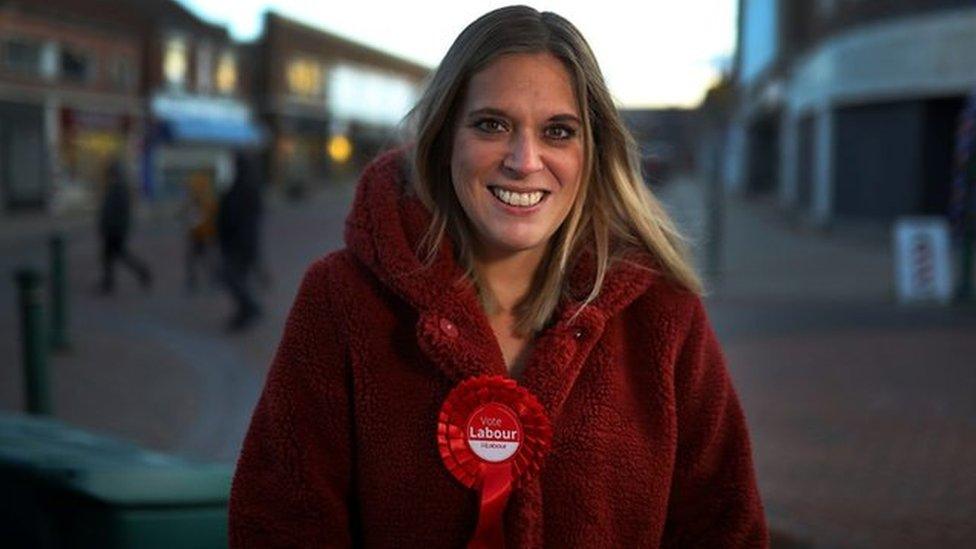
Laura Smith says she wants to see Labour stand for "something different"
While they are content to see new policies developed, they told me that the 10 pledges have to be retained "as a bare minimum".
And Laura Smith, who didn't vote for Sir Keir, maintains that Brexit and not 2019's policies led to Labour's election defeat.
"Moving away from those policies is wrong," she says. "The Tories are taking a lot of these policies and dressing them up as their own.
"It wasn't policies that were hammered on the doorstep. The work wasn't done to sell those policies to our communities. It would be ridiculous to say we want to get away from 2019, as we had some of the answers that would be able to deliver for our communities, especially in the North."
The risk of caution
There is little doubt that in his first year, Sir Keir has appeared to offer competent leadership.
Sir Keir Starmer makes his first PMQs appearance as Labour leader, questioning Dominic Raab on coronavirus testing rates.
At his very first PMQs, he disconcerted Boris Johnson and for weeks he basked in the glow a favourable commentariat who praised the former DPP's questioning as "forensic".
While this may have been necessary to - in the words of one adviser - "pass the smell test that he could be a prime minister' - some of his supporters think that too much store was placed on this image.
One of them said the assumption was made by LOTO that Boris Johnson would be "irreversibly, irredeemably incompetent".
But then the vaccination programme jabbed the Labour leader in the political posterior.
Sometimes being cautious is the riskier option.
As another supporter put it: "Competence doesn't inspire people, though maybe it should."
There is little doubt that Sir Keir will face challenging local elections in England this spring.
Lord Mandelson doesn't expect a "seismic" advance for the party but remains optimistic about Labour's prospects beyond May.
''I don't see any reason to think Keir has hit a ceiling of support," he says.
"He is emerging from the pandemic with a widespread public perception that it would have been no worse if he had been in charge.
"He is a great asset to the Labour Party. We are now firmly back in the ring."
But some on the Left believe that moving away from the Corbyn era does not guarantee electoral success.
Laura Smith says: "I don't know how anyone can look at the polling and think that strategy is the right one.
"I'd urge the Labour Party to be braver. People want change. Politics hasn't worked for them. If all you are going to say is 'I'm not Jeremy Corbyn', that's not good enough."
Delivery
So what has Sir Keir Starmer delivered from his speech almost a year ago?
He has done much to scrub away at the stain of anti-Semitism.
Luke Akehurst would maintain he had no choice. "Tackling anti-Semitism, politically is a 'key in the door' question - he would not be listened to by anyone if he didn't do it."
He has stuck to the pledge not to oppose for its own sake - though that has not been universally welcomed in his party.
He hasn't been able to bring unity - perhaps that was too ambitious an aim.
But he hasn't fully embraced the potential benefits of disunity to help define himself.
He has made a huge advance by having his own supporters in control of the party machine.
The question is to what purpose this will be put in the year ahead.
One supporter confided: "Keir keeps things pretty close.
"If he has a plan, he probably hasn't even told his wife about it."
Related topics
- Published21 March 2021
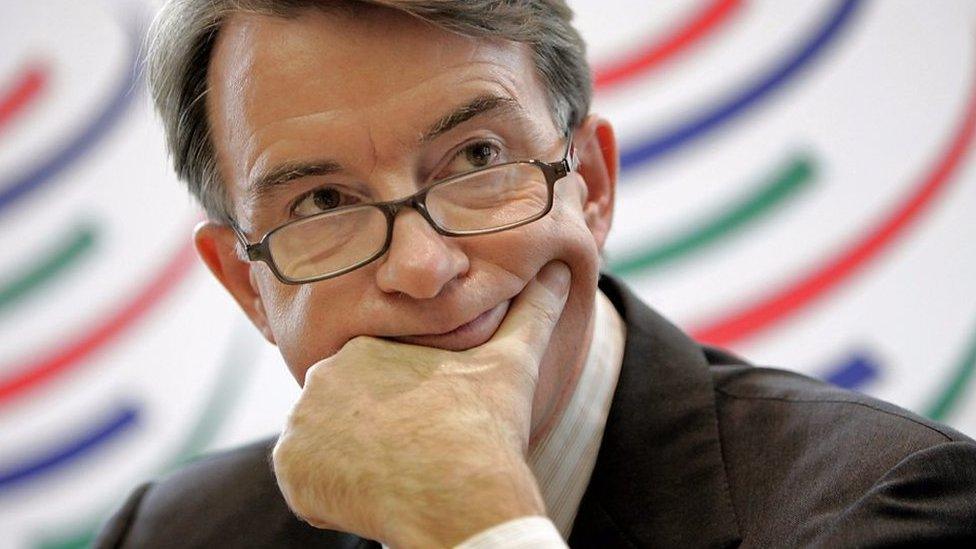
- Published2 March 2021
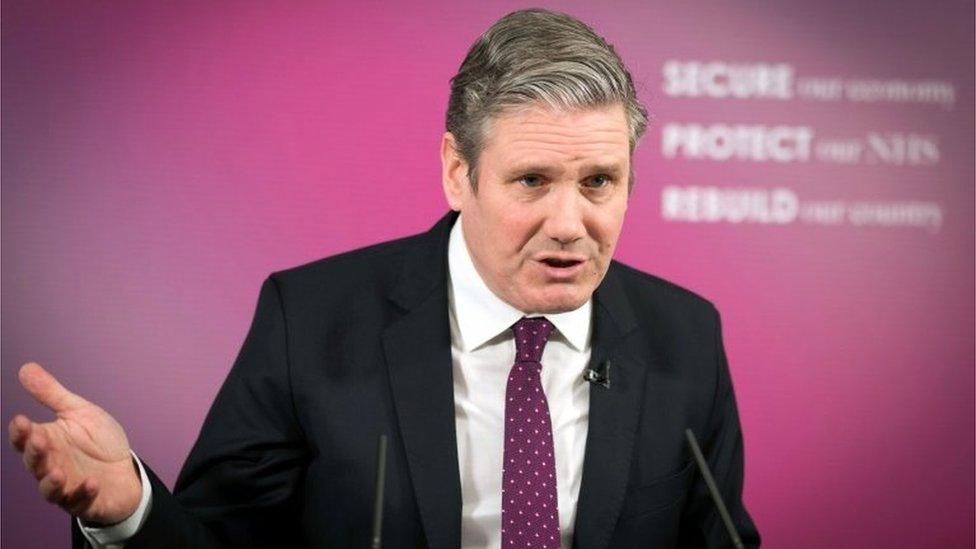
- Published1 March 2021
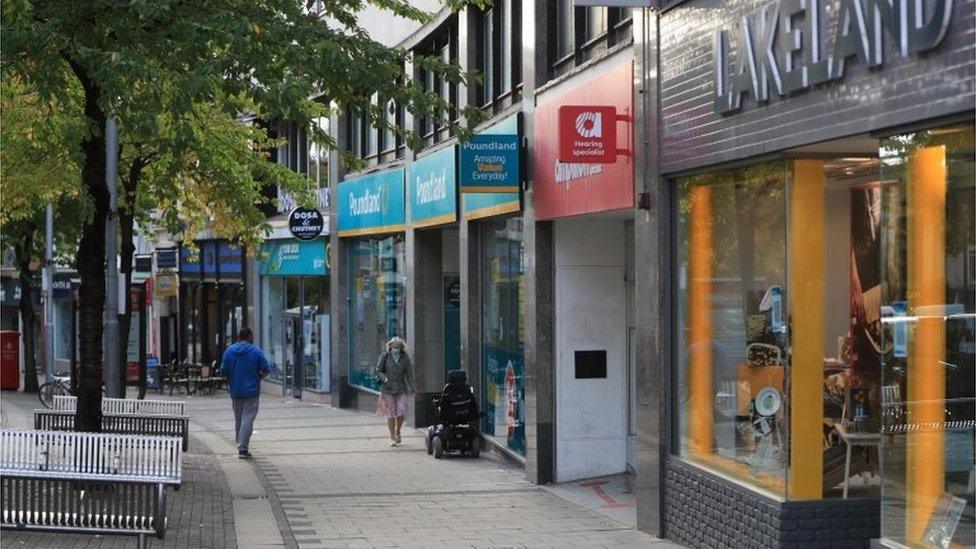
- Published18 February 2021
- Published5 February 2021
